For the first time, dairy producers can genetically select heifers to build a healthier herd. But with this new ability comes the challenge of understanding Zoetis’ New Wellness Traits marketed at CLARIFIDE® Plus (Read more: ZOETIS LAUNCHES CLARIFIDE® PLUS and Can you breed a healthier cow?). In order to help you understand the power of this new tool here are some useful resources to guide you in your understanding.
Key Points
- CLARIFIDE® Plus represents the first commercially available dairy genetic evaluation specifically designed for wellness traits in U.S. dairy cattle.
- CLARIFIDE Plus genomic predictions for wellness traits provide reliable assessments of genetic risk factors for economically relevant health challenges in Holstein cattle.
- The use of Dairy Wellness Profit Index (DWP$) would be expected to offer very similar selection emphasis to that achieved by Net Merit (NM$), making it a practical consideration for producers that have historically used NM$, but would like to apply additional selection emphasis on wellness traits.
- CLARIFIDE Plus provides an expanded suite of genetic selection tools that provide highly relevant information to dairy producers who seek to incrementally improve the health, productivity and profitability of the dairy cattle they care for.
Genetic evaluation and selection in dairy cattle has largely focused on production traits such as milk and protein production. Indirect predictors of health and fertility (e.g.,somatic cell score, productive life, daughter pregnancy rate) are available and there is evidence to support some genetic improvement for these traits. However, presumably as a result of genetic antagonisms between production and health traits as well as changes in management practices, data supports increased incidence of many common diseases in contemporary dairy production systems. Consequently, dairy cows are considered to be less ‘robust’ than previous generations, which has serious implications for the health and fertility of the modern day dairy cow.
Profitable dairy cows are fertile, productive and require minimal extraneous inputs to maintain their health through all phases of production. They generally require fewer veterinary treatments or interventions, without compromising the health, welfare or economic efficiency of the cow, and are less likely to be prematurely culled. Genetic improvement programs that incorporate knowledge regarding differences in risk of disease into selection and breeding strategies have the potential to improve profitability of dairy production through improved prevention and control of economically relevant diseases as well as enhanced animal productivity.
Improving health and fitness traits, commonly referred to as functional or wellness traits, through genetic selection presents a compelling opportunity for dairy producers to help manage disease incidence and improve profitability when coupled with sound management practices. To date, direct predictors for wellness traits related to common disease conditions in dairy production have not been readily available in the U.S. CLARIFIDE® Plus represents the first commercially available dairy genetic evaluation specifically designed for wellness traits in U.S. dairy cattle, providing predictions describing the risk for six common diseases. Routine dehorning of commercial dairy cattle is also of concern for the industry as it relates to animal well-being and costs associated with routine dehorning methods. The selection and breeding of polled stock has been proposed as a strategy for proactively managing these concerns, including use of direct tests for polledness in cattle as well as including the economic benefits within selection indexes. CLARIFIED Plus includes the Zoetis Polled genomic test prediction in the offering to accurately identify and differentiate homozygous vs. heterozygous polled Holstein animals.
Overview
- Mastitis, lameness, metritis, retained placenta, ketosis, displaced abomasum and other health events referred to as wellness traits have a significant impact on herd health, saleable milk and overall herd profitability.
- Profitability is enhanced when the dairy has the advantage of mature cows that are productive for multiple lactations. To reach this longevity, cows must stay healthy and be reproductively sound, in addition to producing milk. Until now, management practices were the primary way to help cows either avoid or survive these health events.
- CLARIFIDE Plus represents the first commercially available dairy genetic evaluation specifically designed for wellness traits in U.S. dairy cattle. Dairy producers can now genomically select heifers for wellness traits at an early age to help build a healthier herd.
- CLARIFIDE Plus is the only genomic test that allows producers to rank animals with the new Dairy Wellness Profit IndexTM (DWP$TM) based on traits that affect health, performance and profit.
- The use of Dairy Wellness Profit Index (DWP$) would be expected to offer similar selection emphasis to that achieved by Net Merit (NM$), making it a practical consideration for producers that have historically used NM$, but would apply additional selection emphasis on wellness traits.
- CLARIFIDE Plus derives accurate genetic predictions for six new wellness traits derived using cutting‐ edge genetic evaluation methodology applied to data collected from millions of health records within U.S. commercial herds. This results in an average Reliability of 50% for the six traits.
- Higher values are more desirable for all traits, thus selecting for a high Standardized Transmitting Abilities (STA) will apply selection pressure for reduced risk of disease.
- In addition to wellness traits, CLARIFIDE Plus includes genetic information for the Zoetis propriety Polled trait.
- DWP$ includes production, fertility, type, longevity and the dairy wellness traits, including polled test results.
- Wellness Trait IndexTM (WT$TM) focuses on the wellness traits (Mastitis, Lameness, Metritis, Retained Placenta, Displaced Abomasum and Ketosis) in addition to Polled and estimates difference in expected lifetime profit associated with risk of disease.
- DWP$ differs from other economic indexes because it includes direct predictions for economically important diseases. By including more characteristics affecting profitability, DWP$ describes more variation in profitability than other indexes.
- With the use of DWP$, producers can potentially make more than $55 more profit per selected female over 10 years using a 15% culling selection strategy, even when test cost is higher than a NM$‐based ranking.
Development of Dairy Wellness Predictions
Genomic predictions for wellness traits were developed by Zoetis based on an independent database of pedigrees, genotypes and production records assembled from commercial dairies and internal assets. Health events were assembled from on-farm dairy production records provided with consent by commercial dairy producers. Data editing procedures to reduce recorded disease incidence to a common format were developed based on review of event codes in on-farm software and consultation with dairy production and veterinary experts. Targeted phenotypes included:
- Mastitis (MAST)
- Lameness (LAME)
- Metritis (METR)
- Retained placenta (RP)
- Displaced abomasum (DA)
- Ketosis (KET)
Genomic data was obtained from commercially tested animals with owner consent or available genotypes within Zoetis research databases. More than 100,000 genotypes were available for consideration as of August 2015. Additional commercial genotypes are added on a weekly basis. Genotypes included in the evaluation were derived from both low and medium density genotypes, all imputed to Illumina® BovineSNP50v2 using an internal imputation reference set and FImpute.CLARIFIDE Plus predictions are derived from a weekly internal genetic evaluation that employs single-step statistical methods for estimating genomic breeding values. This method for genetic evaluation derives a joint relationship matrix based on pedigree and genomic relationships and provides a unified framework that eliminates several assumptions and parameters, thus enabling more accurate genomic evaluations. Table 1 shows the average reliability of genomic predictions for wellness traits in CLARIFIDE Plus. Among approximately 29,901 Holstein heifers less than 2 years of age within the reference dataset, the average reliability was greater than or equal to 49% for all traits. Notably, as direct predictions for individual wellness traits are not presently available, this represents a substantial increase in reliability from zero. Further, the average reliability of genomic predictions for wellness traits continues to increase as more records are added to the evaluation.
Reporting of Wellness Traits in CLARIFIDE® Plus
CLARIFIDE® Plus predictions for wellness traits are expressed as genomic standardized transmitting abilities (STA), similar to how type traits are expressed. Values are centered at 100 with a standard deviation of 5. The reference population included 76,840 animals that had wellness predictions and CLARIFIDE results (Table 2). For all wellness trait predictions, a value of 100 represents average expected disease risk and values of greater than 100 reflect animals with lower expected average disease risk relative to herdmates with lower STA values. Higher values are more desirable for all traits, thus selecting for a high STA will apply selection pressure for reduced risk of disease.
CLARIFIDE Plus predictions for the Polled test will be reported as:
- Tested homozygous polled: The genotype demonstrates that the animal is homozygous polled and will always produce a polled animal regardless of the horned status of the other parent.(Coded PP)
- Polled carrier: The genotype reveals a heterozygous polled animal capable of producing a horned progeny. (Coded PC)
- Tested free of polled (i.e., horned): The genotype is consistent with an animal that is horned. (Coded TP)
- Indeterminate: The polled status of the animal cannot be definitively determined. (Coded I)
Two New Dairy Wellness Indexes
In addition to reporting of individual wellness traits, CLARIFIDE Plus also reports two economic selection indexes to inform selection decisions. Selection indexes are a critical component of many selection strategies as they provide a path for dairy producers to select for comprehensive genetic improvement across many economically important traits. The use of economic selection indexes helps to ensure that the distribution of selection pressure applied to component traits is appropriately balanced relative to the economic impact of the individual traits on dairy profitability. To support selection for reduced risk of disease in dairy females, two economic indexes were developed.
- Wellness Trait Index (WT$): This multi-trait selection index exclusively focuses solely on the wellness traits1 (Mastitis,Lameness, Metritis, Retained Placenta, Displaced Abomasum, Ketosis and Polled) and directly estimates potential profit contribution of the wellness trait for an individual animal that will be passed onto the next generation.
- Dairy Wellness Profit Index (DWP$): This multi-trait selection index includes production, fertility, type, longevity, calving ability, milk quality and the wellness traits, including Polled test results. By combining the wellness traits with those found in the current Net Merit (NM$) index, DWP$ directly estimates the potential profit contribution an individual animal will pass along to the next generation.
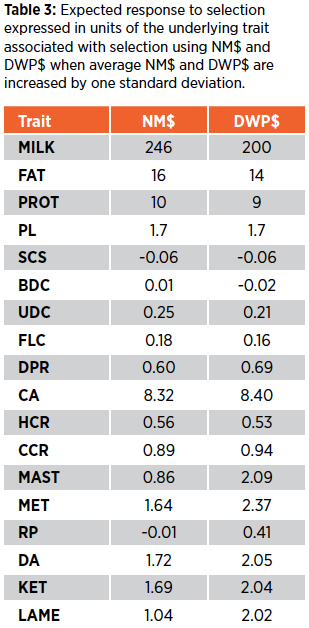
To assess the extent to which use of CLARIFIDE Plus wellness trait indexes would alter selection emphasis relative to use of NM$, the expected response to selection per standard deviation of genetic improvement in the index was estimated. In examining the response of selection between DWP$ and NM$, it is clear that use of DWP$ will result in greater genetic improvement in wellness traits and largely the same selection response for the rest of the traits. There is some decrease in selectionemphasis and expected genetic progress for production traits associated with the use of DWP$ (Table 3), which is consistent with our understanding of the relationship between increased production and disease risk. However, selection using DWP$ will increase milk, fat and protein production, just at a slightly lower genetic rate than would be achieved with alternative indexes that do not consider direct selection for wellness traits. Importantly, the use of DWP$ would be expected to offer very similar selection emphasis to that achieved by NM$, making it a practical consideration for producers who have historically used NM$ but would like to apply additional selection emphasis on wellness traits to achieve healthier, more profitable cows.
Table 4 defines the relative values for component traits in each of the two wellness indexes. All indexes are expressed in a dollar value with higher positive numbers indicating the animal has the genetic potential to generate and transmit more profit over her lifetime.
CLARIFIDE® Plus Educational Videos
- Improving Dairy Health and Profitability With CLARIFIDE® Plus in Holsteins
CLARIFIDE Plus represents the first commercially available dairy genetic evaluation specifically designed for wellness traits in U.S. dairy cattle. Dairy producers now can genomically select heifers for wellness traits at an early age to build a healthier herd. Cheryl Marti, associate director of genetics and reproduction with Zoetis, provides an overview of the technology and how it benefits Holstein dairy producers. - Creating Wellness Trait Genomic Predictions
Dr. Sue DeNise, executive director of VMRD genetics with Zoetis, describes the process and research that went into product development for the wellness traits associated with CLARIFIDE Plus. - Understanding How CLARIFIDE Plus Wellness Traits Are Reported
Dr. Dan Weigel, director of Outcomes Research at Zoetis, describes the wellness traits associated with CLARIFIDE Plus and how the genetic results for each wellness trait are reported. - Exploring CLARIFIDE Plus Wellness Traits: Mastitis
Mastitis is one of the most costly diseases on U.S. dairy herds. Dr. Gary Neubauer, senior manager of Dairy Technical Services, and Dr. Dan Weigel, director of Outcomes Research, discuss the genetic components of mastitis and how the wellness trait is reflected within CLARIFIDE Plus. - Exploring CLARIFIDE Plus Wellness Traits: Lameness
Lameness is a widespread disorder among the U.S. dairy cattle population and has a significant impact on health and productivity. Two Zoetis technical services personnel — Dr. Gary Neubauer, senior manager of Dairy Technical Services, and David Erf, a Dairy Technical Services geneticist — provide an overview of the genetic component of the lameness wellness trait. - Exploring CLARIFIDE Plus Wellness Traits: Metritis and Retained Placenta
Metritis and retained placenta are two significant disorders that impact fresh cows. Two Zoetis technical service personnel — Dr. Michael Lormore, director of Cattle and Equine Technical Services – Dairy, and Dr. Anthony McNeel, senior scientist with Global Genetics Technical Services — discuss the genetic components of these traits and how they are reflected within CLARIFIDE Plus outcomes. - Exploring CLARIFIDE® Plus Wellness Traits: Ketosis and Displaced Abomasum
Two Zoetis technical service personnel — Dr. Michael Lormore, director of Cattle and Equine Technical Services – Dairy, and David Erf, a Dairy Technical Services geneticist — explore two traits included within the CLARIFIDE Plus offering: ketosis and displaced abomasum. The presentation details the significance of the two disorders and the genetic components of each trait. - The CLARIFIDE Plus Wellness Trait Index™ (WT$™)
Brenda Reiter, a Global Genetics Technical Services scientist with Zoetis, provides an overview of the Wellness Trait Index (WT$). The index is a multitrait selection index that focuses specifically on genomic predictions for common health disorders of dairy cattle. - The Power of the Dairy Wellness Profit Index™ (DWP$™)
CLARIFIDE Plus is the only genomic test that allows producers to rank animals with the Dairy Wellness Profit Index (DWP$) based on important traits that affect health, performance and profit. Dr. Jason Osterstock, director of Global Genetics Strategic Marketing with Zoetis, describes how DWP$ was developed and how dairy producers can use DWP$ to make more informed heifer selection decisions. - Strategies for Using the Dairy Wellness Profit Index™ (DWP$™)
David Erf, a Dairy Technical Services geneticist with Zoetis, provides an overview of how to use the Dairy Wellness Profit Index (DWP$). The presentation outlines strategies dairy producers can use to implement DWP$ data to sort, select and mate Holstein dairy heifers. - Achieving Faster Genetic Progress with DWP$
In traditional breeding programs without genomics, it can be challenging to make significant progress within traits that have low heritability. Dr. Dan Weigel, director of Outcomes Research at Zoetis, describes how faster genetic progress can be made through genomic technology by using direct selection of the new wellness traits and using DWP$ within CLARIFIDE Plus. - Achieving Dairy Wellness Outcomes with CLARIFIDE Plus
Cheryl Marti, associate director of genetics and reproduction with Zoetis, provides an overview of the Zoetis Dairy Wellness outcomes approach and how CLARIFIDE Plus supports this process for healthy animals and healthy dairies
Frequently Asked Questions
Q: What health events will be covered by wellness trait predictions?
A: Common diseases in dairy cattle including mastitis, lameness, metritis, retained placenta, displaced abomasum and ketosis will be part of the wellness trait offering.
Q: Why do I need DWP$?
A: There are several reasons to utilize DWP$ in an effective genetic management strategy:
* DWP$ provides comprehensive, accurate and specific information on wellness traits to provide clarity and opportunity to make more profitable animal rankings and decisions.
* By including more characteristics affecting profitability, DWP$ describes more variation in profitability than other indexes.
* The use of DWP$ would be expected to offer very similar selection emphasis for production, reproduction and type traits as NM$ but with additional selection emphasis on wellness traits.
Q: As a dairy producer, if I select cattle based on their wellness trait profile, does that mean that they won’t get mastitis, metritis, etc.?
A: Risk of disease is influenced by genetic and environmental factors. CLARIFIDE Plus describes differences in the genetic risk factors, but genetic selection will not compensate for suboptimal management practices that may cause animals with apparent lower risk of disease to get sick. Producers should continue to use best management practices to prevent disease and apply CLARIFIDE Plus as another tool to improve dairy wellness.
Q: How long before I see a benefit to using these wellness traits?
A: The rate of Genetic progress depends on 4 factors—selection intensity, genetic variation, heritability and generation interval. Herds can make faster genetic progress by using DWP$ through greater selection pressure and higher genetic variation compared to NM$.
Q: How can I justify the investment in CLARIFIDE Plus?
A: The combination of wellness trait information and economic implications delivered through DWP$ provide dairy producers with powerful information that can be used to help build a healthier, more productive herd. With DWP$, producers get a more comprehensive ranking because of the additional differences in profitability described by including direct predictions for economically important health events such as mastitis, lameness, metritis, etc. By including more characteristics affecting profitability, DWP$ (offered only in CLARIFIDE Plus) describes more genetic variation in profitability than other indexes.
Q: How can I order the wellness trait predictions or find additional information?
A: Currently, CLARIFIDE Plus is only available for use in Holstein cattle. Holstein producers can order the CLARIFIDE Plus test through the order form at www.clarifide.com or via Enlight® www.enlightdairy.com . For more information, contact Zoetis Customer Service at 877‐233‐3362 or your Zoetis representative.
THE BULLVINE BOTTOM LINE
Dairy producers have enjoyed the availability of a comprehensive list of economically relevant traits and a robust genetic evaluation system to fuel their genetic improvement strategies. To date, a gap has existed in the ability to improve dairy profitability and dairy cow well-being through direct genetic selection for susceptibility to common diseases. CLARIFIDE® Plus provides accurate genetic predictions for wellness traits derived using cutting-edge genetic evaluation methodology applied to data collected from commercial production settings. The result is an expanded suite of genetic selection tools that provides highly relevant information to dairy producers that seek to continue to improve the health, productivity and profitability of the dairy cattle they care for.
Want to learn more? Check out our upcoming webinar “New Innovation in Genomic Selection to Reduce Disease Risks” presented with Zoetis on March 16th & March 23rd
Get original “Bullvine” content sent straight to your email inbox for free.

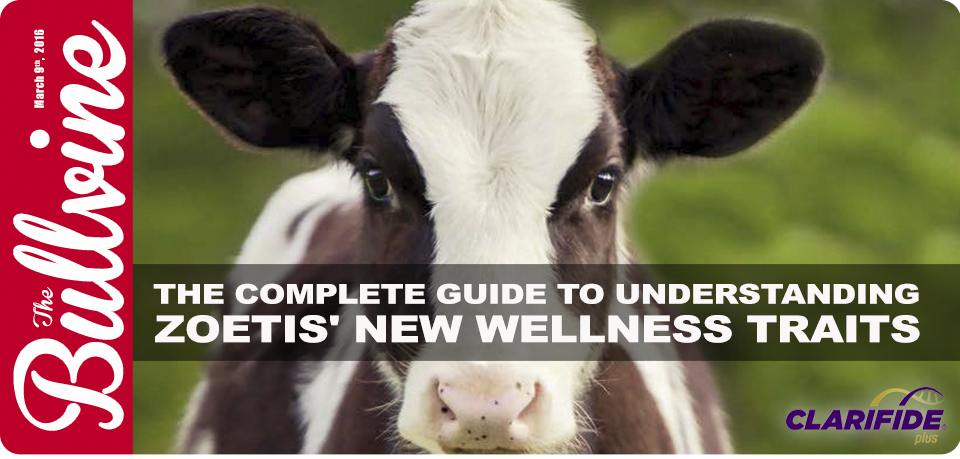






![clarifideplus_1200x834[1]](https://www.thebullvine.com/wp-content/uploads/2016/03/clarifideplus_1200x8341-600x417.png)
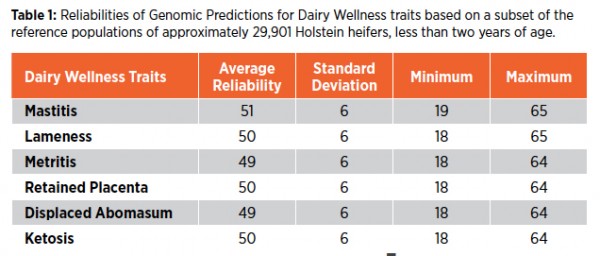
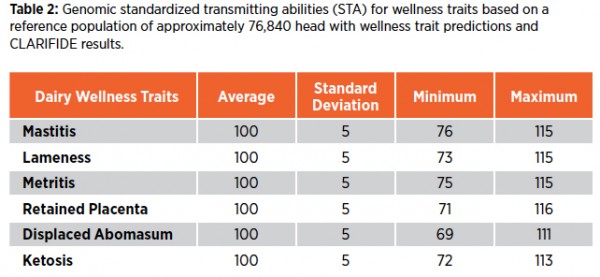
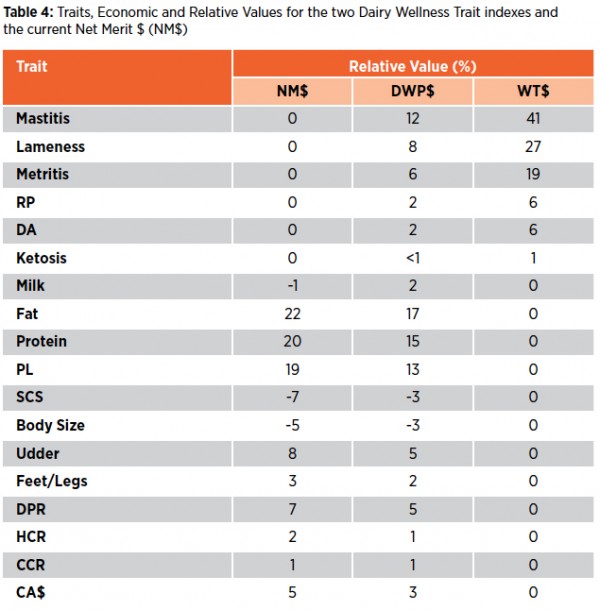










Leave a Reply
You must be logged in to post a comment.